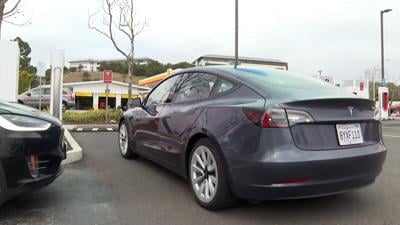EV Mandate Pushback: Car Dealerships Renew Resistance

Table of Contents
Financial Concerns Fueling EV Mandate Pushback
Dealerships are voicing strong concerns about the significant financial burdens associated with complying with EV mandates. These concerns are multifaceted and represent a substantial obstacle to the swift and smooth adoption of electric vehicles.
High Upfront Investment Costs
Adapting to an EV-centric market requires substantial upfront investment. Dealerships cite the considerable costs associated with upgrading their infrastructure to effectively sell and service EVs. This includes:
- High initial investment in charging infrastructure: Installing sufficient numbers of Level 2 and DC fast chargers requires a significant capital outlay, varying based on the dealership's size and location.
- Costs associated with specialized technician training: EV mechanics require specialized training to diagnose and repair EV components, adding to training budgets.
- Need for significant showroom renovations: Showrooms may need renovations to showcase EVs effectively, including dedicated EV display areas and potentially even dedicated service bays.
These substantial initial costs can be a major barrier for smaller dealerships, potentially forcing them out of business or hindering their ability to invest in other crucial aspects of their operations.
Inventory Management Challenges
The transition to EVs also presents unique inventory management challenges. Dealerships are grappling with:
- Different storage and handling requirements for EVs vs. ICE vehicles: EV batteries require specific storage conditions and handling procedures to maintain their performance and safety.
- Uncertainty about consumer demand for specific EV models: Predicting consumer demand for various EV models and trims is challenging due to the relative novelty of the market and the rapid pace of technological advancements.
- Increased risk of inventory obsolescence due to rapid technological advancements: Battery technology and EV features are constantly evolving, increasing the risk that inventory becomes obsolete quickly.
Reduced Profit Margins on EVs
A key concern among dealerships is that current profit margins on EVs are often lower than those on traditional internal combustion engine (ICE) vehicles. This is attributed to several factors:
- Lower service revenue potential for EVs compared to ICE vehicles: EVs generally require less frequent and less extensive maintenance compared to ICE vehicles, reducing potential service revenue.
- Competition from direct-to-consumer EV brands: Direct-to-consumer brands bypass traditional dealership networks, intensifying competition and potentially squeezing profit margins.
- Pressure on pricing due to government incentives and subsidies: Government incentives and subsidies aimed at making EVs more affordable can put pressure on dealership pricing and profitability.
Consumer Demand and Infrastructure Gaps as Obstacles
Beyond financial concerns, dealerships highlight obstacles related to consumer demand and infrastructure limitations as major factors in the EV mandate pushback.
Concerns about Consumer Readiness
Dealerships are concerned about consumer readiness for widespread EV adoption. Key concerns include:
- Lack of public charging stations in many areas: The limited availability of public charging stations, particularly in rural areas, causes range anxiety among potential EV buyers.
- Relatively high purchase prices compared to gasoline-powered cars: The higher upfront cost of EVs compared to gasoline-powered vehicles remains a significant barrier for many consumers.
- Uncertainty regarding long-term battery life and replacement costs: The long-term cost of battery replacement and the uncertainty surrounding battery lifespan are key concerns for potential EV buyers.
Inadequate Charging Infrastructure
The lack of widespread and reliable public charging infrastructure is a significant hurdle. Dealerships are highlighting the following issues:
- Uneven distribution of charging stations across different regions: Charging infrastructure is concentrated in urban areas, leaving rural regions underserved.
- Concerns about charging station reliability and availability: Issues such as malfunctioning chargers and long wait times at charging stations discourage EV adoption.
- Need for increased investment in charging infrastructure development: Significant investment in both public and private charging infrastructure is necessary to support widespread EV adoption.
Legislative and Regulatory Hurdles in EV Mandate Implementation
The implementation of EV mandates is also hampered by legislative and regulatory hurdles. Dealerships are calling for more support and clarity from policymakers.
Lack of Clear Guidelines and Support
Dealerships argue for clearer regulatory guidelines and more government support:
- Uncertainty regarding future regulations and policies: The constantly evolving regulatory landscape creates uncertainty and makes long-term planning difficult.
- Need for consistent support programs and incentives: Consistent and predictable government support programs and incentives are essential to encourage investment in EV infrastructure and technology.
- Requests for more time to adapt to the changing market landscape: Dealerships are requesting more time to adapt to the rapid shift towards EVs, allowing them to make necessary infrastructure and training investments.
Concerns about Fair Competition
Dealerships are also concerned about the competitive landscape, particularly the rise of direct-to-consumer EV manufacturers:
- Competition from established and emerging EV brands: The influx of new EV brands, some bypassing traditional dealerships, creates intense competition.
- Concerns about market share erosion and reduced profitability: This increased competition threatens to erode market share and reduce dealership profitability.
- Advocating for a level playing field for all participants: Dealerships advocate for a regulatory environment that ensures fair competition for all participants in the automotive market.
Conclusion
The EV mandate pushback from car dealerships underscores the complex challenges inherent in the transition to electric vehicles. Addressing financial burdens, consumer readiness, charging infrastructure gaps, and regulatory uncertainties is paramount for successful EV adoption. Open dialogue and collaborative solutions involving policymakers, manufacturers, and dealerships are essential to navigate this transition effectively and avoid further intensification of the EV mandate pushback. Ignoring these concerns could lead to a stalled EV market and hinder the broader goals of environmental sustainability. Understanding the complexities of the EV mandate pushback is a critical first step towards creating a sustainable and equitable future for the automotive industry. Let's work together to overcome these hurdles and accelerate the responsible adoption of electric vehicles.

Featured Posts
-
 Ohio Train Disaster Persistent Toxic Chemicals Contaminate Buildings
Apr 24, 2025
Ohio Train Disaster Persistent Toxic Chemicals Contaminate Buildings
Apr 24, 2025 -
 Bitcoins Btc Recent Climb A Deep Dive Into Market Drivers
Apr 24, 2025
Bitcoins Btc Recent Climb A Deep Dive Into Market Drivers
Apr 24, 2025 -
 Exec Office365 Breaches Millions Made Through Insider Attacks Fbi Reveals
Apr 24, 2025
Exec Office365 Breaches Millions Made Through Insider Attacks Fbi Reveals
Apr 24, 2025 -
 The End Of Ryujinx Nintendo Intervention And Project Closure
Apr 24, 2025
The End Of Ryujinx Nintendo Intervention And Project Closure
Apr 24, 2025 -
 Death Of Sophie Nyweide Child Actor From Mammoth And Noah At 24
Apr 24, 2025
Death Of Sophie Nyweide Child Actor From Mammoth And Noah At 24
Apr 24, 2025
